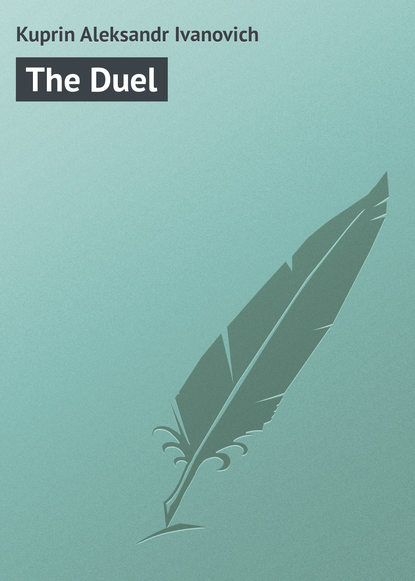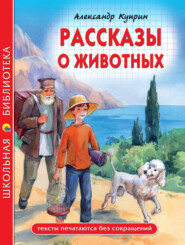По всем вопросам обращайтесь на: info@litportal.ru
(©) 2003-2024.
✖
The Duel
Настройки чтения
Размер шрифта
Высота строк
Поля
Down by the door stood two young exquisites, both of whom had many acquaintances among officers, and had even been guests at the regimental soirées. One of them was a Treasury official, the other a landed proprietor and brother of the police magistrate of the town. They both belonged to the so-called “cream” of Society.
The Treasury official turned white, but forced a smile, and answered in an affable tone —
“Excuse me, gentlemen, but can’t we join? We are old acquaintances, you know. My name is Dubiezki. We should not interfere with you at all.”
“Possibly in making love, but not when the fight begins,” added the magistrate’s brother, who tried to adopt a good-humoured tone.
“Out of this!” screamed Biek-Agamalov. “March to the door!”
“Gentlemen, by all means, put the starar out,” sneered Artschakovski.
A horrible confusion arose in the room. Tables and chairs were thrown over; the men shrieked, laughed, and stamped with all their might. The flames of the lamps rose like fiery tongues on high. The cold night air penetrated through the open windows, but without any cooling or calming effect on all these half-demented fighting-cocks. The two civilians had already been thrown into the backyard, where they were heard fiercely screeching and threatening with tears in their voices —
“Opritschniker,[20 - The name given to Ivan the Terrible’s lifeguards and executioners.] brigands! This affair will cost you dear. We shall lodge a complaint with your commander, with the Governor.”
“Oo-oo-oo-oo-oo,” Viätkin sneered in mockery, whilst stretching out of the window. “Go to blazes!”
It seemed to Romashov as if all the events of the day had followed one another without a break, but also without the least intelligible connection, just as if a series of wild pictures in loud and motley colours had been unrolled before his eyes. Again were heard the scraping of the violin and the tambourine’s blustering noise. One of the “partners” had now gone so far as to pirouette on the floor with nothing but his shirt on. A pretty, slender woman, who had up to then escaped Romashov’s notice, with dishevelled hair over her bare neck, and sharp, prominent shoulder-blades, wound her arms round poor Lieschtschenko’s neck and sang in his ear in her shrill soprano, and in unison with the violin’s awful melody:
“When consumption sets its mark,
And you’re lying pale and stark,
And doctors are seen fumbling round your couch.”
Bobetinski slung a glass of ale between the curtains of one of the little, dark cabinets, whence very soon proceeded an angry, but sleepy, thick voice —
“Aren’t you ashamed, sir? Who dares …? Such a low swine!”
“I say! how long have you been here?” asked Romashov of the lady in the red basquine, whilst, as it were, in an absent-minded way, he rested his hand on her strong, warm knee.
She made some answer, but he did not hear it. A fresh scene of savagery had absorbed all his attention. Sub-lieutenant Lbov was driving before him one of the musicians, and banging him on the head all the time with the tambourine. The poor Jew, terrified out of his wits, ran from corner to corner, screaming and babbling his unintelligible jargon, with wholly ineffectual attempts to catch his long, fluttering coat-tails, and incessantly glancing behind him from the corners of his eyes at his unmerciful persecutor. Everybody was laughing. Artschakovski fell flat on the floor, and wriggled with tears in his eyes and in alarming convulsions of laughter. Directly afterwards the other Jew’s piercing yells were audible. Another of the company had snatched the violin, and thrown it down with fearful violence. With a crashing sound that harmonized, in an almost touching way, with the musician’s desperate cries for help, the instrument broke into a thousand fragments. What followed this Romashov never perceived, inasmuch as, for several minutes, he was in a sort of dark “nirvana.” When he had somewhat regained the use of his reason, he saw, as though in a fever-dream, that all in the room were running round each other with wild shrieks and gestures of despair. For an instant the whole swarm gathered round Biek-Agamalov, only in the next instant to be scattered like chaff in all directions. The majority sought safety in the little, dark cabinets.
“Out of it! I won’t stand a single one!” shrieked Biek-Agamalov in Berserker fury. He ground his teeth, stamped on the floor, and struck about him with his clenched fists. His face was crimson; the veins in his forehead from the roots of his hair to his nose stood like strained ropes; his head was lowered like a bull’s, and his unnaturally prominent eyes with their bloodshot whites were terrifying. He was unable to utter any human sounds, but groaned, like a wild beast, in a vibrating voice —
“Ah-ah-ah-ah!”
Suddenly, whilst bending the upper part of his body to the left with the suppleness of a panther, he drew his sabre, as quick as lightning, from its sheath. The broad, sharp blade described, with a whistling sound, several rapid circles over his head.
In frantic terror every living creature fled helter-skelter from the room through doors and windows, the women screaming hysterically, the men trampling down all that lay in their way. Romashov was carried by the current irresistibly towards the door, where an officer rushing past caused him, by the sharp facet of his uniform-button, a long, bleeding scratch on his face. The next moment all stood whooping and yelling in the yard, except Romashov, who alone remained by the door of the room. He felt his heart beating with increased force and quickness; but the murderous, unbridled scene filled him not only with terror, but also with an intoxicating feeling of savage, exulting defiance.
“I will have blood!” screamed Biek-Agamalov, with gnashing teeth. The sight of the terror he inspired deprived him of the last remains of understanding and reflection. With frantic strength and rage he smashed, with a few strokes, all the furniture nearest to him, and, after that, hurled his sabre with such force at a large mirror that the glass splinters hailed on all sides. With another blow he laid waste the table, which was crowded with a number of bottles and glasses, the fragments and contents of which were thrown all over the floor.
But just at that moment cried a piercing voice of indescribable fury and boldness —
“Fool! Cad!”
This insult was hurled by the same bare-headed woman with naked arms as had just embraced Lieschtschenko. This was the first time that Romashov had noticed her. She was standing in a recess behind the stove, leaning forward with clenched hands tightly pressed against her hips, and pouring out an uninterrupted flow of “Billingsgate” with a rapidity and readiness which the vilest market-woman might have envied.
“Fool! Cad! Scum! I am not afraid of you! Fool! Fool! Fool!”
Biek-Agamalov lowered his sabre, and seemed, for a moment, to lose all power over himself. Romashov saw how his face grew whiter and whiter, how his eyebrows puckered, and how the yellow pupils first darkened and then hurled a blinding flash of diabolical hatred and rage which no longer knew bounds. His knees gave way, and his head fell on his chest. At that moment, Biek-Agamalov was no longer a human being. He was transformed into a bloodthirsty wild beast straining every nerve for the fatal leap.
“Silence!” It sounded as if he had spat out the word. Speak he could not.
“Scoundrel, brute, beast, I shall not be silent!” shrieked the fury in the stove corner, her body trembling all over at every word she hurled.
Romashov felt himself getting whiter and whiter every moment. He felt a sensation of void in his brain, a sensation of release from every oppressive act of thought or reflection. A curious mixture of joy and terror arose in his soul, just as the bubbles of sparkling wine ascend to the edge of a goblet. He saw Biek-Agamalov, whilst continually following the woman with his eyes, slowly raise his sabre above his head. An irresistible flow of frantic jubilation, fear, inconsiderate boldness, carried Romashov away. He rushed forward so rapidly that he did not even hear Biek-Agamalov hiss his last question —
“Will you be silent? For the last time – ”
Romashov, with a force he never thought he was capable of, gripped Agamalov’s wrist. During the course of a few seconds and at a distance of a couple of inches between their faces, the two officers eyed one another without moving, stiff as if carved out of stone. Romashov heard his comrade’s quick, panting breath; he saw his eyes glitter with hate and a thirst for revenge, and his lips foam with the spasmodic movements of his lower jaw; but he felt that the fire of wrath would, in a few minutes, be extinguished in this man who had never yet sought, of his own accord, to curb his passions. But to Romashov this feeling of proud triumph in a game of life and death, from which he now knew he should come out the victor, was almost intolerable. He knew that all those who were anxiously watching this scene from outside also realized in what deadly danger he stood. Out in the yard and by the open windows there brooded such a hush and quiet that, all of a sudden, a nightingale a few paces off began to trill her joyous lay.
“Let me go,” came at last like a hoarse whisper from Biek-Agamalov’s bitten lips.
“Biek, you must never strike a woman,” replied Romashov calmly. “You would blush for it as long as you lived.”
The last sparks of rage and madness now died out in Agamalov’s eyes. Romashov drew a deep breath as if from a long swoon. His heart beat irregularly and quick, and his head was again heavy and feverishly hot.
“Let me go!” shrieked Biek-Agamalov once more in a fierce tone, and tried to release himself. Romashov felt he would no longer be able to keep his hold of him; but he had no further dread of his wrath. He said in a caressing brotherly tone, as he laid his hand on his comrade’s shoulder —
“Forgive me, Biek, but I know that a day will come when you will thank me for this.”
Biek-Agamalov with a loud snap stuck his sabre into its sheath.
“All right, confound you!” he screamed in an angry tone, in which, however, there was a note of shame and confusion. “We’ll settle this matter afterwards. But what right have you – ?”
The valiant crowd in the yard now understood that all danger was over for the present. With loud, but not quite natural, peals of laughter, the lot now rushed into the room. But he now seemed extinguished, his strength exhausted, and there was something apathetic and ironically contemptuous about him.
Now Madame Schleyfer herself – a massive lady with a hard look, small dark pouches under her eyes, disappearing eyelashes, and great layers of fat on her neck and bosom – entered the room. She attacked first one and then the other of the officers; took tight hold of one by a button, of another by a sleeve, and howled to each of them who could stand and listen her everlasting song —
“Gentlemen, gentlemen, who will make good all this? Who will pay for the mirror, the furniture, the bottles, the girls?”
All this meanwhile was settled to the satisfaction of the authorities by the same mysterious “benefactor” who had provided for everything else in the course of this memorable excursion. The officers left the room in groups. Every one of them inhaled with delight the mild, pure air of the May night. Romashov felt all his being thrilled with a certain joyous agitation. It seemed to him as if all traces of the day’s orgies had vanished from his brain, as if a pair of innocent fresh lips had repurified and refreshed him by a soft kiss on his brow.
Biek-Agamalov came up to him, took his hand, and said —
“Romashov, come and ride in my carriage. I wish you to do so.”
And when Romashov, on one occasion during the journey home, turned towards the right to observe the awkward gallop of the horses, Biek-Agamalov seized his hand and pressed it for a long time warmly – nay, so hard that it almost caused pain. Not a word, however, passed between the two officers during the whole way.
XIX
THE violent emotion felt by every member of the company during the wild scene we have just depicted found expression in a nervous irritability which, on their return to the mess-room, took the form of reckless arrogance and gross misbehaviour to all who happened to come across the officers on their way home. A poor Jew coming along was stopped and deprived of his cap. Olisár got up in the carriage, and insulted, in the outskirts of the town, in the middle of the street, all passers-by in a manner which cannot be decently described. Bobetinski whipped his coachman for no reason whatever. The others sang and bawled with all their might; only Biek-Agamalov, who rode beside Romashov, sat all the time angry, silent, and taciturn.
Notwithstanding the lateness of the hour, the mess-rooms were brilliantly illuminated and full of people. In the card and billiard-rooms and at the buffet creatures with unbuttoned coats, flaming faces, vacantly staring eyes and of uncertain gait, helplessly collided with each other, heavily fuddled by the fumes of wine and tobacco smoke. Romashov, who was walking about and nodding to several of the officers, also found among them, to his great astonishment, Nikoläiev. He was sitting by Osadchi, red in face and intoxicated, but holding himself upright. On seeing Romashov approaching he eyed him sharply for a few seconds, but afterwards turned abruptly aside, so as to avoid holding out his hand to the latter, meanwhile conversing with his neighbour with increased interest.
“Viätkin, come here and sing,” bellowed Osadchi over the heads of the rest.
“Yes, come let us sing,” chanted Viätkin, in reply, parodying, imitating, and caricaturing a melody from the Church ritual —
The Treasury official turned white, but forced a smile, and answered in an affable tone —
“Excuse me, gentlemen, but can’t we join? We are old acquaintances, you know. My name is Dubiezki. We should not interfere with you at all.”
“Possibly in making love, but not when the fight begins,” added the magistrate’s brother, who tried to adopt a good-humoured tone.
“Out of this!” screamed Biek-Agamalov. “March to the door!”
“Gentlemen, by all means, put the starar out,” sneered Artschakovski.
A horrible confusion arose in the room. Tables and chairs were thrown over; the men shrieked, laughed, and stamped with all their might. The flames of the lamps rose like fiery tongues on high. The cold night air penetrated through the open windows, but without any cooling or calming effect on all these half-demented fighting-cocks. The two civilians had already been thrown into the backyard, where they were heard fiercely screeching and threatening with tears in their voices —
“Opritschniker,[20 - The name given to Ivan the Terrible’s lifeguards and executioners.] brigands! This affair will cost you dear. We shall lodge a complaint with your commander, with the Governor.”
“Oo-oo-oo-oo-oo,” Viätkin sneered in mockery, whilst stretching out of the window. “Go to blazes!”
It seemed to Romashov as if all the events of the day had followed one another without a break, but also without the least intelligible connection, just as if a series of wild pictures in loud and motley colours had been unrolled before his eyes. Again were heard the scraping of the violin and the tambourine’s blustering noise. One of the “partners” had now gone so far as to pirouette on the floor with nothing but his shirt on. A pretty, slender woman, who had up to then escaped Romashov’s notice, with dishevelled hair over her bare neck, and sharp, prominent shoulder-blades, wound her arms round poor Lieschtschenko’s neck and sang in his ear in her shrill soprano, and in unison with the violin’s awful melody:
“When consumption sets its mark,
And you’re lying pale and stark,
And doctors are seen fumbling round your couch.”
Bobetinski slung a glass of ale between the curtains of one of the little, dark cabinets, whence very soon proceeded an angry, but sleepy, thick voice —
“Aren’t you ashamed, sir? Who dares …? Such a low swine!”
“I say! how long have you been here?” asked Romashov of the lady in the red basquine, whilst, as it were, in an absent-minded way, he rested his hand on her strong, warm knee.
She made some answer, but he did not hear it. A fresh scene of savagery had absorbed all his attention. Sub-lieutenant Lbov was driving before him one of the musicians, and banging him on the head all the time with the tambourine. The poor Jew, terrified out of his wits, ran from corner to corner, screaming and babbling his unintelligible jargon, with wholly ineffectual attempts to catch his long, fluttering coat-tails, and incessantly glancing behind him from the corners of his eyes at his unmerciful persecutor. Everybody was laughing. Artschakovski fell flat on the floor, and wriggled with tears in his eyes and in alarming convulsions of laughter. Directly afterwards the other Jew’s piercing yells were audible. Another of the company had snatched the violin, and thrown it down with fearful violence. With a crashing sound that harmonized, in an almost touching way, with the musician’s desperate cries for help, the instrument broke into a thousand fragments. What followed this Romashov never perceived, inasmuch as, for several minutes, he was in a sort of dark “nirvana.” When he had somewhat regained the use of his reason, he saw, as though in a fever-dream, that all in the room were running round each other with wild shrieks and gestures of despair. For an instant the whole swarm gathered round Biek-Agamalov, only in the next instant to be scattered like chaff in all directions. The majority sought safety in the little, dark cabinets.
“Out of it! I won’t stand a single one!” shrieked Biek-Agamalov in Berserker fury. He ground his teeth, stamped on the floor, and struck about him with his clenched fists. His face was crimson; the veins in his forehead from the roots of his hair to his nose stood like strained ropes; his head was lowered like a bull’s, and his unnaturally prominent eyes with their bloodshot whites were terrifying. He was unable to utter any human sounds, but groaned, like a wild beast, in a vibrating voice —
“Ah-ah-ah-ah!”
Suddenly, whilst bending the upper part of his body to the left with the suppleness of a panther, he drew his sabre, as quick as lightning, from its sheath. The broad, sharp blade described, with a whistling sound, several rapid circles over his head.
In frantic terror every living creature fled helter-skelter from the room through doors and windows, the women screaming hysterically, the men trampling down all that lay in their way. Romashov was carried by the current irresistibly towards the door, where an officer rushing past caused him, by the sharp facet of his uniform-button, a long, bleeding scratch on his face. The next moment all stood whooping and yelling in the yard, except Romashov, who alone remained by the door of the room. He felt his heart beating with increased force and quickness; but the murderous, unbridled scene filled him not only with terror, but also with an intoxicating feeling of savage, exulting defiance.
“I will have blood!” screamed Biek-Agamalov, with gnashing teeth. The sight of the terror he inspired deprived him of the last remains of understanding and reflection. With frantic strength and rage he smashed, with a few strokes, all the furniture nearest to him, and, after that, hurled his sabre with such force at a large mirror that the glass splinters hailed on all sides. With another blow he laid waste the table, which was crowded with a number of bottles and glasses, the fragments and contents of which were thrown all over the floor.
But just at that moment cried a piercing voice of indescribable fury and boldness —
“Fool! Cad!”
This insult was hurled by the same bare-headed woman with naked arms as had just embraced Lieschtschenko. This was the first time that Romashov had noticed her. She was standing in a recess behind the stove, leaning forward with clenched hands tightly pressed against her hips, and pouring out an uninterrupted flow of “Billingsgate” with a rapidity and readiness which the vilest market-woman might have envied.
“Fool! Cad! Scum! I am not afraid of you! Fool! Fool! Fool!”
Biek-Agamalov lowered his sabre, and seemed, for a moment, to lose all power over himself. Romashov saw how his face grew whiter and whiter, how his eyebrows puckered, and how the yellow pupils first darkened and then hurled a blinding flash of diabolical hatred and rage which no longer knew bounds. His knees gave way, and his head fell on his chest. At that moment, Biek-Agamalov was no longer a human being. He was transformed into a bloodthirsty wild beast straining every nerve for the fatal leap.
“Silence!” It sounded as if he had spat out the word. Speak he could not.
“Scoundrel, brute, beast, I shall not be silent!” shrieked the fury in the stove corner, her body trembling all over at every word she hurled.
Romashov felt himself getting whiter and whiter every moment. He felt a sensation of void in his brain, a sensation of release from every oppressive act of thought or reflection. A curious mixture of joy and terror arose in his soul, just as the bubbles of sparkling wine ascend to the edge of a goblet. He saw Biek-Agamalov, whilst continually following the woman with his eyes, slowly raise his sabre above his head. An irresistible flow of frantic jubilation, fear, inconsiderate boldness, carried Romashov away. He rushed forward so rapidly that he did not even hear Biek-Agamalov hiss his last question —
“Will you be silent? For the last time – ”
Romashov, with a force he never thought he was capable of, gripped Agamalov’s wrist. During the course of a few seconds and at a distance of a couple of inches between their faces, the two officers eyed one another without moving, stiff as if carved out of stone. Romashov heard his comrade’s quick, panting breath; he saw his eyes glitter with hate and a thirst for revenge, and his lips foam with the spasmodic movements of his lower jaw; but he felt that the fire of wrath would, in a few minutes, be extinguished in this man who had never yet sought, of his own accord, to curb his passions. But to Romashov this feeling of proud triumph in a game of life and death, from which he now knew he should come out the victor, was almost intolerable. He knew that all those who were anxiously watching this scene from outside also realized in what deadly danger he stood. Out in the yard and by the open windows there brooded such a hush and quiet that, all of a sudden, a nightingale a few paces off began to trill her joyous lay.
“Let me go,” came at last like a hoarse whisper from Biek-Agamalov’s bitten lips.
“Biek, you must never strike a woman,” replied Romashov calmly. “You would blush for it as long as you lived.”
The last sparks of rage and madness now died out in Agamalov’s eyes. Romashov drew a deep breath as if from a long swoon. His heart beat irregularly and quick, and his head was again heavy and feverishly hot.
“Let me go!” shrieked Biek-Agamalov once more in a fierce tone, and tried to release himself. Romashov felt he would no longer be able to keep his hold of him; but he had no further dread of his wrath. He said in a caressing brotherly tone, as he laid his hand on his comrade’s shoulder —
“Forgive me, Biek, but I know that a day will come when you will thank me for this.”
Biek-Agamalov with a loud snap stuck his sabre into its sheath.
“All right, confound you!” he screamed in an angry tone, in which, however, there was a note of shame and confusion. “We’ll settle this matter afterwards. But what right have you – ?”
The valiant crowd in the yard now understood that all danger was over for the present. With loud, but not quite natural, peals of laughter, the lot now rushed into the room. But he now seemed extinguished, his strength exhausted, and there was something apathetic and ironically contemptuous about him.
Now Madame Schleyfer herself – a massive lady with a hard look, small dark pouches under her eyes, disappearing eyelashes, and great layers of fat on her neck and bosom – entered the room. She attacked first one and then the other of the officers; took tight hold of one by a button, of another by a sleeve, and howled to each of them who could stand and listen her everlasting song —
“Gentlemen, gentlemen, who will make good all this? Who will pay for the mirror, the furniture, the bottles, the girls?”
All this meanwhile was settled to the satisfaction of the authorities by the same mysterious “benefactor” who had provided for everything else in the course of this memorable excursion. The officers left the room in groups. Every one of them inhaled with delight the mild, pure air of the May night. Romashov felt all his being thrilled with a certain joyous agitation. It seemed to him as if all traces of the day’s orgies had vanished from his brain, as if a pair of innocent fresh lips had repurified and refreshed him by a soft kiss on his brow.
Biek-Agamalov came up to him, took his hand, and said —
“Romashov, come and ride in my carriage. I wish you to do so.”
And when Romashov, on one occasion during the journey home, turned towards the right to observe the awkward gallop of the horses, Biek-Agamalov seized his hand and pressed it for a long time warmly – nay, so hard that it almost caused pain. Not a word, however, passed between the two officers during the whole way.
XIX
THE violent emotion felt by every member of the company during the wild scene we have just depicted found expression in a nervous irritability which, on their return to the mess-room, took the form of reckless arrogance and gross misbehaviour to all who happened to come across the officers on their way home. A poor Jew coming along was stopped and deprived of his cap. Olisár got up in the carriage, and insulted, in the outskirts of the town, in the middle of the street, all passers-by in a manner which cannot be decently described. Bobetinski whipped his coachman for no reason whatever. The others sang and bawled with all their might; only Biek-Agamalov, who rode beside Romashov, sat all the time angry, silent, and taciturn.
Notwithstanding the lateness of the hour, the mess-rooms were brilliantly illuminated and full of people. In the card and billiard-rooms and at the buffet creatures with unbuttoned coats, flaming faces, vacantly staring eyes and of uncertain gait, helplessly collided with each other, heavily fuddled by the fumes of wine and tobacco smoke. Romashov, who was walking about and nodding to several of the officers, also found among them, to his great astonishment, Nikoläiev. He was sitting by Osadchi, red in face and intoxicated, but holding himself upright. On seeing Romashov approaching he eyed him sharply for a few seconds, but afterwards turned abruptly aside, so as to avoid holding out his hand to the latter, meanwhile conversing with his neighbour with increased interest.
“Viätkin, come here and sing,” bellowed Osadchi over the heads of the rest.
“Yes, come let us sing,” chanted Viätkin, in reply, parodying, imitating, and caricaturing a melody from the Church ritual —

















